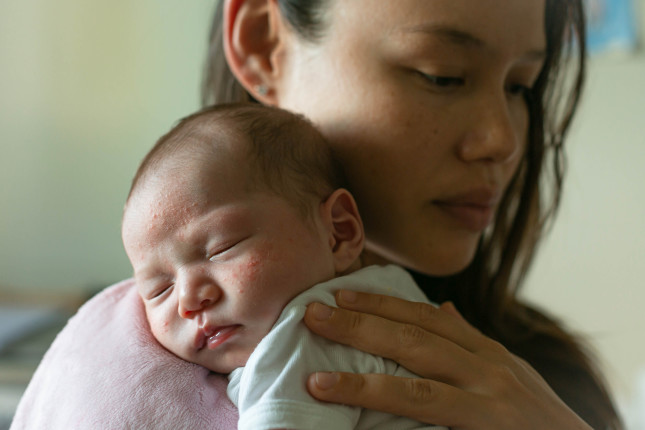-
Mental Health Conditions: U.S. Policies and Practice to Address the Most Common Complication of Pregnancy and Childbirth
›
Maternal mental health (MMH) conditions are the most common complication of pregnancy and childbirth, affecting 1 in 5 women or childbearing individuals (800,000 U.S. families each year). Recent studies show that suicide and overdose combined are the leading cause of death for mothers in the first year postpartum, contributing to the distressingly high maternal mortality rate in the United States. Sadly, 75 percent of those experiencing MMH conditions go untreated, increasing the risk of multigenerational, long-term negative impacts on the physical, emotional, and developmental health of both the mother and child. The COVID-19 pandemic has fueled a three-fold increase in the number of pregnant women and new mothers experiencing MMH conditions. Women of color are disproportionately impacted by both the pandemic and MMH conditions, experiencing both at rates 2-3 times higher than white women.
-
Mental Health Conditions Are the Most Common Complication of Pregnancy and Childbirth
›
Having a new baby should be the happiest time in a family’s life.
But it doesn’t always work out that way.
During pregnancy or the first year following pregnancy, 1 in 5 women or childbearing people will experience anxiety or depression. In fact, mental health issues are the most common complication of pregnancy and childbirth, turning joy into sadness, loneliness, confusion, regret, and guilt.
I experienced postpartum depression and anxiety after my son was born 20 years ago. We had a very scary emergency C-section. He refused to take a bottle, and I was exhausted and overwhelmed as I struggled to care for a newborn and a toddler. I told my husband I wanted a divorce and ran away from home, truly believing my family would be better off without me. It took almost six months to find the help I needed.
-
COVID-19 Vaccine Has No Demonstrated Impact on Miscarriage Rates in the United States, Research Shows
›
COVID-19 continues to pose a high risk to pregnant people who contract the virus. Despite this concern, hesitancy surrounding the safety of the COVID-19 vaccine during pregnancy remains, write the authors of a preprint article on COVID-19 vaccines and pregnancy outcomes. As COVID-19 vaccines become more widely available, some have raised concerns regarding potential links between receiving a COVID-19 vaccine and experiencing miscarriage (also known as spontaneous abortion), and other adverse outcomes. However, miscarriage is a common occurrence – around 10 to 15 percent of all pregnancies in the United States end in miscarriage – and multiple studies have found no increase in miscarriage in persons who received a COVID-19 vaccine.
-
Respectful Maternity Care and Maternal Mental Health are Inextricably Linked
›
A positive birth experience is not a luxury, but a necessity, said Hedieh Mehrtash, consultant for the Department of Sexual and Reproductive Health and Research at the World Health Organization (WHO), at a panel during the Maternal Mental Health Technical Consultation hosted by the United States Agency for International Development’s (USAID) MOMENTUM Country and Global Leadership, in collaboration with WHO and the United Nations Population Fund.
-
Misconceptions on Miscarriage – The Dangers of Cultural Silence
›
In the United States, approximately 10 to 15 percent of known pregnancies end in miscarriage. But this doesn’t capture the full picture. In reality, studies show that as many as half of all pregnancies may end in miscarriage, with the vast majority occurring before people realize they are pregnant. A miscarriage is defined as pregnancy loss before 20 weeks gestation. While some health conditions such as autoimmune disorders, polycystic ovary syndrome (PCOS), and diabetes can exacerbate the risk of having a miscarriage, the exact causes of pregnancy loss are largely unknown.
-
Engaging Marginalized Groups is Essential to Achieving Universal Health Coverage
› Too often, many in my community are excluded from sexual and reproductive health services, said Ruth Morgan Thomas, co-founder and Global Coordinator of the Global Network of Sex Work Projects, in today’s episode of Friday Podcasts. This episode features highlights from a recent Wilson Center and UNFPA event where Thomas and Zandile Simelane, an HIV Youth Advocate from Eswatini, address the barriers that their respective communities—sex workers and HIV positive youth—face in accessing sexual and reproductive health (SRH) services and universal health coverage (UHC).
Too often, many in my community are excluded from sexual and reproductive health services, said Ruth Morgan Thomas, co-founder and Global Coordinator of the Global Network of Sex Work Projects, in today’s episode of Friday Podcasts. This episode features highlights from a recent Wilson Center and UNFPA event where Thomas and Zandile Simelane, an HIV Youth Advocate from Eswatini, address the barriers that their respective communities—sex workers and HIV positive youth—face in accessing sexual and reproductive health (SRH) services and universal health coverage (UHC). -
We Have to Put the Last Mile First: Ensuring Sexual and Reproductive Health for All
›
Whether marginalized populations, such as adolescents, LGBTQ+ people, migrant workers, and sex workers are included in health services can be a “litmus test” of our progress towards universal health coverage (UHC), said Sivananthi Thanenthiran, Executive Director of Asian-Pacific Resource and Research Centre for Women (ARROW). Thanenthiran spoke at a recent Wilson Center event with the United Nations Population Fund (UNFPA) and the World Health Organization (WHO) Department of Sexual and Reproductive Health and Research about the importance of engaging stakeholders in sexual and reproductive health (SRH) to achieve UHC for all. In SRH services, the most marginalized and most vulnerable populations are often left out, she said. When engaging stakeholders, representatives from these groups must be included to ensure equity in healthcare services.
-
Beyond Pride: Ensuring Affirming, Respectful Sexual and Reproductive Healthcare for LGBTQ+ Communities
›
In June 1969, the Stonewall Uprising in Manhattan served as a critical tipping point for the Gay Liberation Movement in the United States. Each June, communities around the world celebrate Pride Month to honor this struggle and continue fighting for a more equal future. More than 50 years after Stonewall, Lesbian, Gay, Bisexual, Transgender, and Queer or Questioning (LGBTQ+)* people in the United States struggle to access culturally competent and respectful sexual and reproductive health care.
Showing posts from category sexual and reproductive health.






 Too often, many in my community are excluded from sexual and reproductive health services, said Ruth Morgan Thomas, co-founder and Global Coordinator of the
Too often, many in my community are excluded from sexual and reproductive health services, said Ruth Morgan Thomas, co-founder and Global Coordinator of the 



